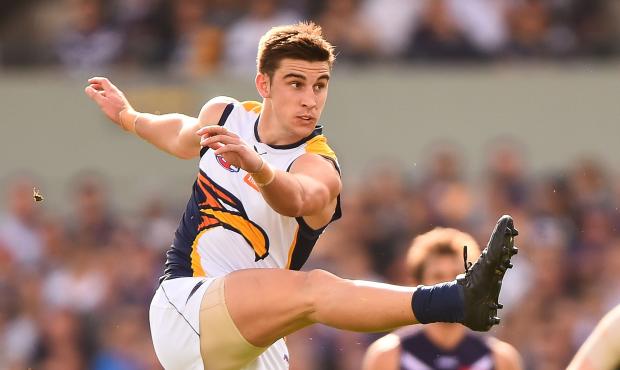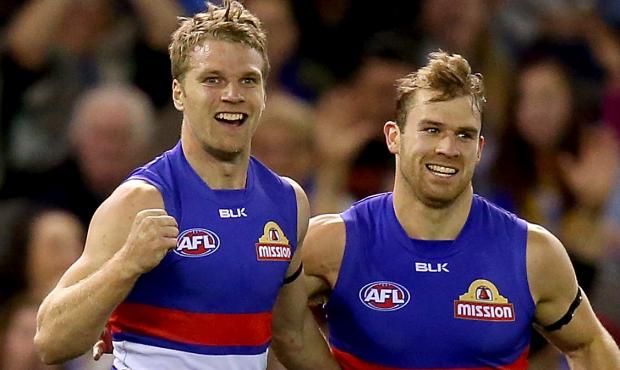HOW has the west won?
The question has confounded football watchers for most of the season as West Coast and Western Bulldogs continue their unlikely tilts at the 2015 premiership.
After all, very few people outside the clubs expected much more than a few 'she'll be right' statements from either team throughout the year.
When the teams met in round one, all the talk was of inexperienced coaches, season-ending injuries to key players and undermanned defences.
Now, with three rounds remaining, they are both in the top four and fighting to hang on to their respective positions (second and fourth) until the end of the season.
And they have captured everyone's imagination with exciting, rapid-fire football.
The Eagles depend on clearances to gain territory, giving their defence time to set up behind the ball.
In the past month, the Eagles have averaged 42.2 clearances per game – equal league-leaders alongside Hawthorn in that time.
When they don't win the ball the Eagles midfielders apply pressure and work the mark hard.
As a result, their defenders don't rely on winning match-ups as much as reading opposition kicks off the boot, backing their midfield to rush the kicker.
Brad Sheppard (108 marks), Elliot Yeo (100 marks), Sharrod Wellingham (98 marks) and Will Schofield (93 marks) have all punched above their weight while Jeremy McGovern (89 marks) has been an exceptional co-ordinator in defence.
Elliot Yeo has been a revelation for West Coast this season. Picture: AFL Media
At the stoppages, Brownlow medallist Matt Priddis has been brilliant once again in 2015, sitting fourth in the competition for score assists with 32. Adelaide's unsung hero Tom Lynch leads in that statistic.
The Bulldogs have similarly revamped their backline under Luke Beveridge, creating an attacking mindset that has seen the Bulldogs be the best-performed club in the past month.
The Bulldog defenders' starting points are much further in front of their opponent than those of most clubs as they back Easton Wood to take intercept marks, and Robert Murphy and Jason Johannisen to counterattack.
Such positioning might seem simple to combat but an opposition scout told AFL.com.au that teams who want to keep their forward structure in place struggle to sit alongside the Bulldogs' defenders for fear of being sucked too far up the ground and being rendered next to useless if their own midfielders regain possession.
The positioning of the Bulldogs' defenders puts doubt into the minds of opponents kicking inside 50 and, given the Bulldogs play on after a mark 34.3 per cent of the time (third in the AFL), something to worry about if they make a mistake.
It must be nice for Matthew Boyd to watch opponents worry about their kicks.
The veteran has been reborn as a distributor, heading where ageing skippers such as Hawthorn's Sam Mitchell and the Sydney Swans' Jarrad McVeigh go to fly.
Dale Morris remains 'Mr Fixit', organising the less experienced bigs: Fletcher Roberts, Michael Talia and Joel Hamling.
The Bulldogs are the best in the competition at stopping the opposition from scoring once inside 50, with the figure just 41.6 per cent while West Coast sits fourth with opponents scoring just 45 per cent of the time.
The rebound and stoppage work has also pushed both clubs into the top four positions for inside 50s, still a reasonable indicator of success.
Both have interesting forward set-up too, and have led the competition for percentage of scores per inside 50 for the past month. The Eagles score 53 per cent of the time and the Bulldogs score 52 per cent.
The class of Josh Kennedy (who leads the competition for both goals and score involvements per game), Mark LeCras and Jack Darling is obvious but Simpson has found suitable roles for Jamie Cripps and Josh Hill to complement their strengths.
Hill can play wide of the contest, using his smart football brain and clean hands to create an option for the midfield or crumb off packs.
To think that five years ago he was lambasted for standing on the mark in an uninterested fashion when playing for the Western Bulldogs; in a different environment he has become a different player.
Cripps can kick goals but his forward pressure is sensational, in the tradition of former Eagles great Phil Matera whose harassment used to drive defenders mad.
Both players were recruited from other clubs with the Eagles recruiters recognising their ability to play a role.
Their work has seen the Eagles lead the competition for overall scores per forward 50 entries while the Bulldogs have only started to move up that ladder in the past month.
In that time Jake Stringer (13 goals), Stewart Crameri (15) and Tory Dickson (14) have been a terrifying trio for opposition defenders.
Jake Stringer and Stewart Crameri have shared 29 goals in the past month. Picture: AFL Media
Getting the ball to ground has been critical for these players, who rely on pace and being smart to create opportunities. Although the Bulldogs have averaged 15.5 marks inside 50 per game in the past month, well above their season average of 10.8 marks inside 50 per game, they are most dangerous when the ball hits the ground.
After winning four of their first five games, all against teams now in the top eight, the Bulldogs have not played a team currently in the eight since losing to Fremantle in round seven.
In that time they have won one and lost one against both Melbourne and Port Adelaide, and lost to Geelong at Simonds Stadium.
Both teams have been revelations and their coaches, Luke Beveridge and Adam Simpson, are breaths of fresh air on the scene.
They have forced the script to be re-written and we wait with pens poised for the next act to be played out.
The title is ready to go: How the West was Won!
Stats supplied by Champion Data


